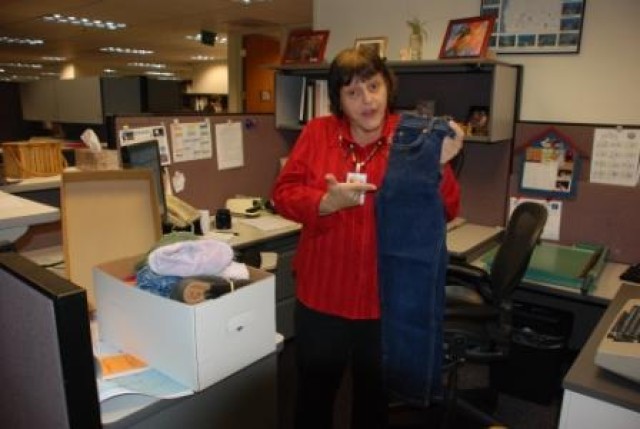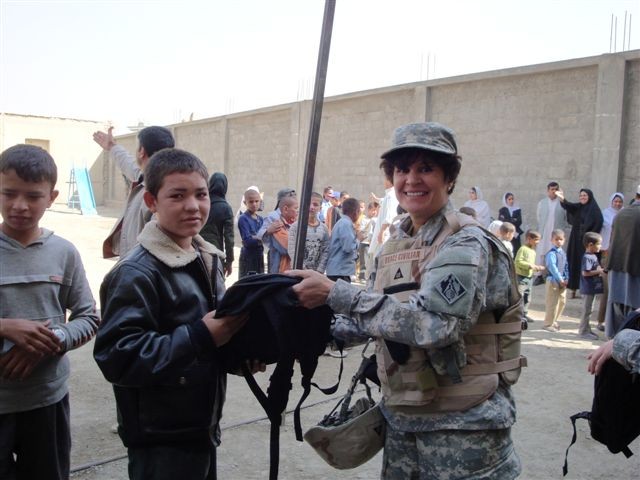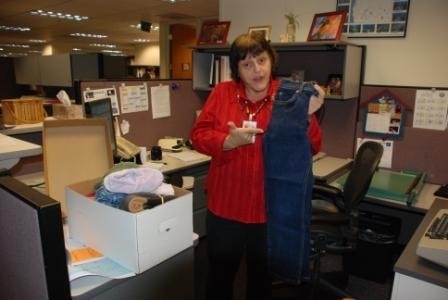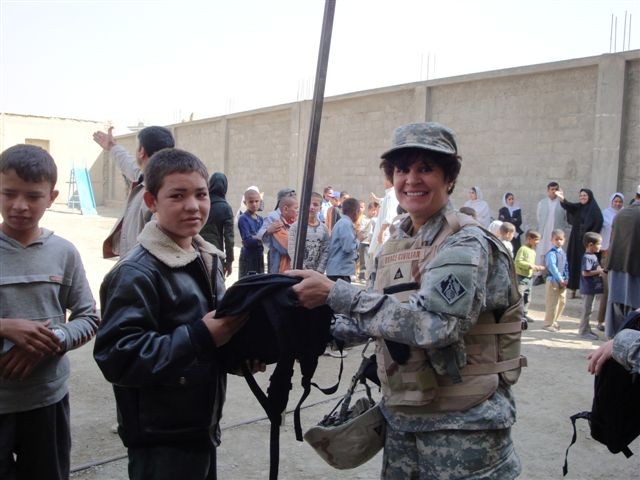Portland District employees find all kinds of reasons to volunteer for overseas contingency operations deployments. Some are motivated by financial gain, others by the opportunity to use their professional skills in a country that desperately needs them, and some by the chance of adventure and learning about new cultures.
Once on the ground at Afghanistan Engineer District - North, however, some deployees discover a whole new meaning for their existence in Afghanistan. Marissa Smith, for example, after finding her feet as an AED-N program analyst in April 2009, found another place close to her heart through the Camp Eggers Volunteer Community Relations program.
The VCR Program, located near AED-N district offices at Qalaa House, is a command-directed outreach program started by camp chaplains who saw the tremendous need of Kabul's poor and displaced people and Afghan refugees who have come back to Afghanistan from Pakistan. The program's volunteers visit schools, medical centers and refugee compounds to provide clothing, shoes, blankets, and hygiene and school supplies to those in need.
"Most volunteers start out by sorting donated items that have been sent from the U.S. before they go on an actual VCR mission," said Army Chaplain Lt. Col. Eric Albertson, one of the chaplains who bring together U.S. and coalition troops and civilian employees like Smith who want to make a difference in Afghanistan.
"One of my first missions was to a deaf school in Kabul where we delivered 250 backpacks filled with school supplies to children," said Smith. "Their eyes were filled with excitement and I'm so thankful that I could help bring them a little hope."
The mission was nerve-wracking for some because the school is located in an area of busy, unpaved roads, making the operation dangerous. But U.S. Marines were in place and had the entire area secured, said Smith.
"VCR missions are conducted as military operations due to security concerns, with half the people on the mission dedicated to providing security, including the Afghan National Police," said Albertson.
The VCR also regularly visits refugee camps and medical facilities. Albertson said a first-time visit to a camp is a huge dose of reality for some volunteers.
For those who have not seen poverty up close, he said, it can resonate on a very deep level.
"At the refugee camps there are a number of children without shoes, and there's often mud and broken glass on the ground, which is a difficult thing for anyone to see," he said. "But in some ways I think it's good to see, because it's real. It's different than watching a television commercial that solicits money to help some child somewhere in the world."
Bob van der Borg, who deployed to AED-N in October 2009 from Portland District's Project Management and Planning Branch, also felt fortunate to go on the mission, and said he looked at the refugees' plight not with despair but optimism.
"What surprised me was that in my job I find that one tribe will not associate with another when it comes to road-building contracts," van der Borg said. "But at this refugee camp, there are about six tribes living together all trying to do the same thing - which is escaping the realities set before them. They all face similar circumstances. Hopefully when they get out of this situation they won't go back as separate tribes, but they might actually go out and form a village."
"The missions are so important," said Smith, who regularly sorts items for the VCR. "But without donations sent from the U.S. by churches, civic groups and individuals, we wouldn't be able to do them."
Having heard stories from their deployed colleagues, a number of Portland District employees independently collect and send donations to the VCR.
Shirley Glover, Programs and Project Management Division, is one.
"When you hear a story from a co-worker about what they've done with the VCR program, it's hard to not get involved and send a donation," she said. "I regularly visit local thrift stores and buy clothes for the kids, then stick them in a box under my desk. When it's full I take it to the post office and mail it off."
The reasons that some deploy to Afghanistan may not change, but once others land on Afghan soil and see the need of the people, they discover a whole new purpose for being there.
"The mission to the deaf school was one of the most rewarding experiences I have had since arriving in this country - it's given new meaning to my deployment," said Smith.
The Camp Eggers Volunteer Community Relations program is an all-volunteer program made possible by donations of new and gently used clothing, shoes, toys, blankets and school supplies. (No religious materials, please.)
If you would like to donate, please send your items by non-priority mail to:
VCR
CSTC-A, Pool House
APO AE 09356
International mail is subject to customs examination in the destination country. A completed customs form with the contents and value of items declared is required. You can learn more about the customs process and obtain a form by visiting http://www.usps.com/international/customs.htm.




Social Sharing